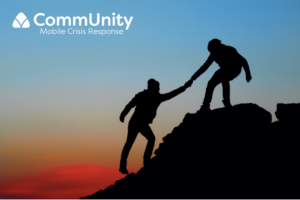
The major goals of CommUnity’s Mobile Crisis Outreach (MCO) program are to de-escalate crisis situations and provide an alternative to hospitals and jails for those experiencing a mental health crisis.
This begs the question: How do you help someone in crisis without calling law enforcement or first responders?
With an 88% hospital and jail diversion rate in FY2021, no one knows the answer to that question better than the dedicated counselors who do it every single day. We asked two of our MCO team members to share more about their unique experiences providing support for those in crisis. What makes it worthwhile and what is it really like to respond to a crisis situation in-person?
Andrea Courtney, On-Call Mobile Crisis Outreach Counselor & Overnight Crisis Intervention Specialist, M.A., T-LMHC (Temporarily Licensed Clinical Mental Health Counselor)
I began my time at MCO in January 2020 as an intern in my final semester of my Master’s program. As I write this, I have been working as an MCO Counselor for a little over a year.
I believe the first time I felt like I was making a positive impact on a client’s life was during my internship while creating a safety plan and really validating what a client was struggling with at the time. After graduating in May 2020, I was offered a paid position and gladly accepted. I began my job during the COVID-19 pandemic, and it provided me with a lot of on-the-job training and allowed me to see the emotional impact of the pandemic. Typically, when working with a client, we strive to listen and validate their experiences, discuss options, offer understanding, empathy and emotional support, assess risk and assist in working to achieve safety and stability.
Personally, I think one of the most fulfilling parts of being an MCO counselor is knowing that someone is seeking us out and trusting us with their struggle during a vulnerable and difficult time. Crisis intervention doesn’t exactly conclude with a perfect solution, but I often do see a change before wrapping up a call. Whether it’s being able to see the difference in a person’s expression and body language or knowing that we helped to cultivate a bit of hope and resilience, I feel invigorated at the end of the majority of our calls. I am very honored to be able to do this work, and I truly think it gives me a lot of perspective and allows me to stay connected with the community.
One of the best things about working as part of the MCO team is that you really are part of a team. I feel extremely supported by fellow MCO counselors. I learn a lot from them, whether it’s debriefing before or after a dispatch, asking a supervisor a question, or chatting during a staff meeting or while working on notes together.
Lexys Sillin, On-Call Mobile Crisis Outreach Counselor
The nature of crisis means working with people during incredibly vulnerable moments, even for counselors. Surprisingly, much of crisis work involves taking care of myself. To be responsible for someone else’s emotions means to be responsible for my own. As a crisis counselor, I constantly emotionally regulate myself so that I do not project onto a client. A client may show rage, sadness, or hostility, but these emotions can be defense mechanisms. At times, it can be difficult; there may be clients with stories that resonate with my own, remind me of someone in my social circle, or share particularly traumatic experiences. Crisis work forces me to look at the things I carry around with me; my experiences, my trauma, and my relationships influence me in my work. Although challenging, I can also tap into those experiences to demonstrate empathy and compassion, especially in the face of tough emotions. As Brene Brown mentions in her work on empathy:
“Empathy has no script. There is no right way or wrong way to do it. It’s simply listening, holding space, withholding judgment, emotionally connecting, and communicating that incredibly healing message of ‘You’re not alone.’”
Working in crisis also contributes to reconstructing narratives around mental health. Crisis is a part of living. Even if crisis is not the main plot, it is always a recurring theme. We all experience low points, loss, and mental turbulence, yet are resistant to opening up conversations around these feelings. Especially in the proud, midwestern state of Iowa, mental health rarely makes the priority list. People may try to cope with their crisis alone due to shame, often increasing feelings of isolation. Consider when someone asks, “How are you?” The only socially acceptable response is, “Fine,” or some close variant. Crisis work gives someone the opportunity to say, “Actually, things are really bad, and I’m not okay,” while still ensuring the world will continue to turn.
Become an MCO Counselor
If you are searching for a position in which you can make a difference in our community and provide support to those experiencing a mental health crisis, apply to be an On-Call Mobile Crisis Outreach Counselor. MCO Counselors provide counseling to clients on dispatch calls where a crisis is occurring. Counselors talk to clients about their situation and ask questions about their mental health history. After counselors have a good understanding of what the client is experiencing, they work with the client to develop a safety plan and connect them to community resources.
Learn more about joining the MCO team at builtbycommunity.org/mco-oncall-counselor.
And remember, if things feel too overwhelming, the trained crisis counselors at CommUnity are here to help. You can reach out to our 24/7 crisis phone or text lines, or if you need to speak to someone in person, our 24/7 Mobile Crisis team.
Call/Text: 1-855-325-4296
Chat: IowaCrisisChat.org
Mobile Crisis Outreach: Call 1-855-800-1239 and ask to speak with Mobile Crisis.